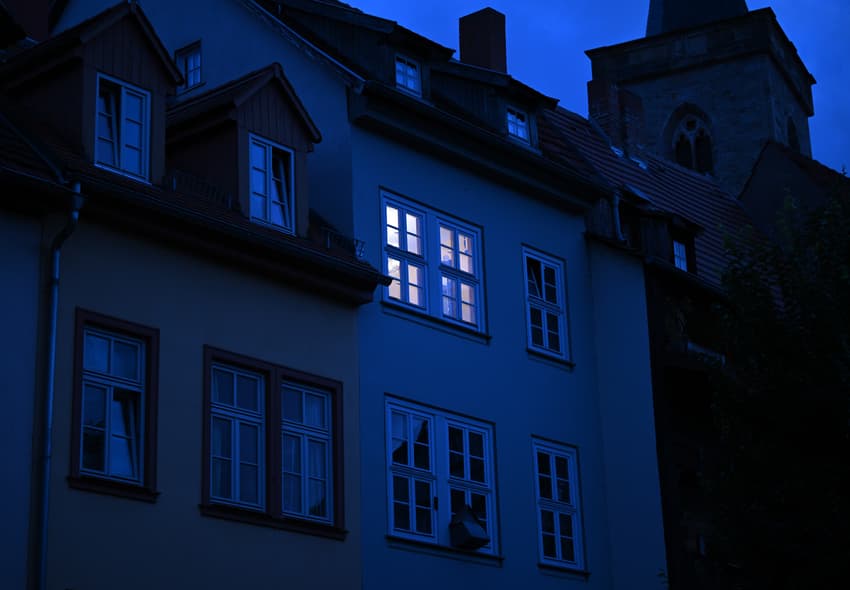Consumers in Germany face rising electricity costs in 2023

Rising energy costs are already a huge headache for households in Germany. But with increasing grid fees from next year, electricity bills are set to get even steeper.
Consumers in Germany should prepare for price rises when it comes to electricity, according to the comparison portal Verivox.
That's because network usage fees are to rise by an average of 20.4 percent nationwide in the coming year - more than ever before, Verivox said after evaluating initial data.
Grid fees are made up of costs for the major transmission lines of electricity and for local distribution networks. According to industry figures, the share of grid fees in the electricity price for household customers will average around 20 percent in 2022, but can vary greatly from region to region.
As part of the third relief package, the German government intends to stabilise the fees charged to households and industry for using the major transmission networks with a subsidy of just under €13 billion, but details still remain unclear. Meanwhile, the Verivox survey reportedly focuses on charges for local, smaller distribution networks, which affect households more than industry in percentage terms.
READ ALSO: German government pledges to subsidise rising electricity bills
The largest increase in fees will be seen by consumers in the northern German state of Mecklenburg-Western Pomerania, with a rise of 52 percent, according to Verivox. That could correspond to an annual additional burden of €208 per year on average.
In Brandenburg the current net fees are set to rise, according to data, by around 48 percent (plus €182), in Berlin around 30 percent (plus €79). The burden would be lowest in Bremen (plus 4 percent), Thuringia (9 percent) and Baden-Württemberg (10 percent).
"The energy crisis is also having an impact on network charges," said Thorsten Storck, energy expert at Verivox.
"Due to the exploding wholesale market prices, the costs for grid losses in electricity transport have also increased significantly. In addition, upstream transmission grid fees will rise in the coming year."
Over the past 15 years, the fees have risen by 68 percent. "For consumers, this means further increases in electricity prices," Storck said.
According to Verivox calculations, a family of three currently pays about €2,153 per year for 4000 kilowatt hours of electricity. With rising network fees, the costs increase according to initial data to €2,227.
Storck called for the German government to bring in an electricity price cap as soon as possible.
The coalition government, made up of the Social Democrats, Greens and Free Democrats, has said it is planning to dampen grid fees by skimming off high windfall profits from electricity producers to fund a price cap.
"The state must urgently bring in the already announced electricity price brake in order to relieve households in the energy crisis further," said Storck.
READ ALSO: Why electric fan heaters could make energy crisis worse
Comments
See Also
Consumers in Germany should prepare for price rises when it comes to electricity, according to the comparison portal Verivox.
That's because network usage fees are to rise by an average of 20.4 percent nationwide in the coming year - more than ever before, Verivox said after evaluating initial data.
Grid fees are made up of costs for the major transmission lines of electricity and for local distribution networks. According to industry figures, the share of grid fees in the electricity price for household customers will average around 20 percent in 2022, but can vary greatly from region to region.
As part of the third relief package, the German government intends to stabilise the fees charged to households and industry for using the major transmission networks with a subsidy of just under €13 billion, but details still remain unclear. Meanwhile, the Verivox survey reportedly focuses on charges for local, smaller distribution networks, which affect households more than industry in percentage terms.
READ ALSO: German government pledges to subsidise rising electricity bills
The largest increase in fees will be seen by consumers in the northern German state of Mecklenburg-Western Pomerania, with a rise of 52 percent, according to Verivox. That could correspond to an annual additional burden of €208 per year on average.
In Brandenburg the current net fees are set to rise, according to data, by around 48 percent (plus €182), in Berlin around 30 percent (plus €79). The burden would be lowest in Bremen (plus 4 percent), Thuringia (9 percent) and Baden-Württemberg (10 percent).
"The energy crisis is also having an impact on network charges," said Thorsten Storck, energy expert at Verivox.
"Due to the exploding wholesale market prices, the costs for grid losses in electricity transport have also increased significantly. In addition, upstream transmission grid fees will rise in the coming year."
Over the past 15 years, the fees have risen by 68 percent. "For consumers, this means further increases in electricity prices," Storck said.
According to Verivox calculations, a family of three currently pays about €2,153 per year for 4000 kilowatt hours of electricity. With rising network fees, the costs increase according to initial data to €2,227.
Storck called for the German government to bring in an electricity price cap as soon as possible.
The coalition government, made up of the Social Democrats, Greens and Free Democrats, has said it is planning to dampen grid fees by skimming off high windfall profits from electricity producers to fund a price cap.
"The state must urgently bring in the already announced electricity price brake in order to relieve households in the energy crisis further," said Storck.
READ ALSO: Why electric fan heaters could make energy crisis worse
Join the conversation in our comments section below. Share your own views and experience and if you have a question or suggestion for our journalists then email us at [email protected].
Please keep comments civil, constructive and on topic – and make sure to read our terms of use before getting involved.
Please log in here to leave a comment.